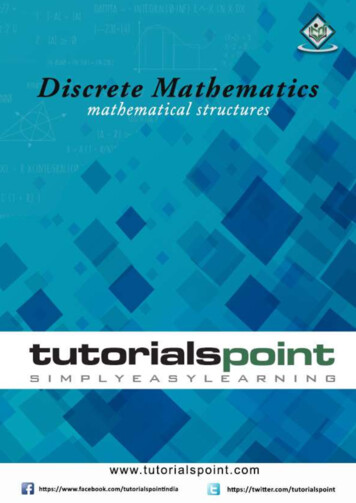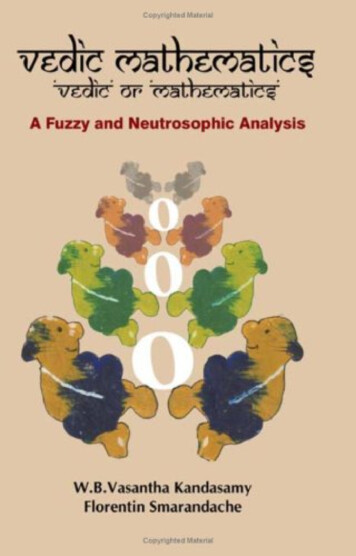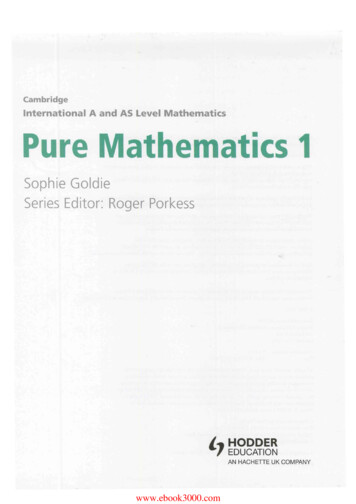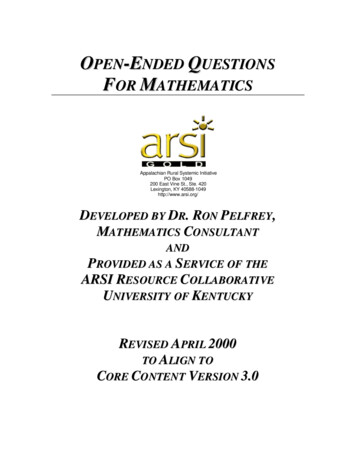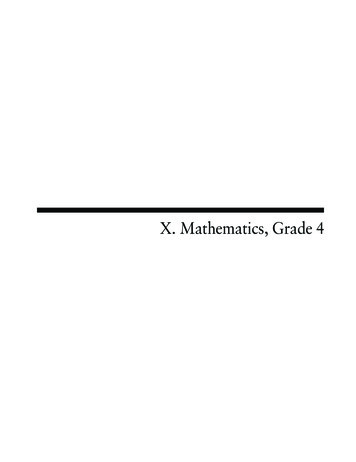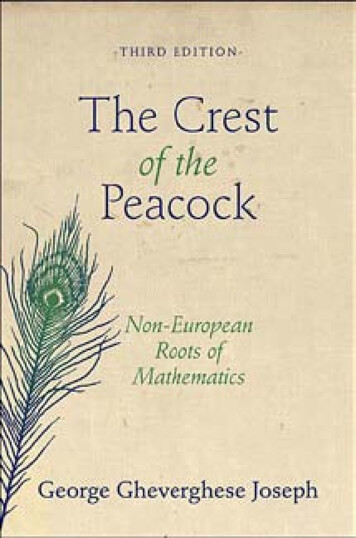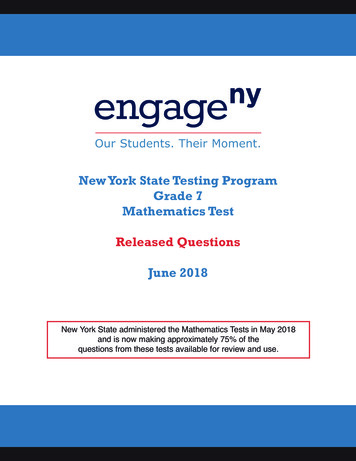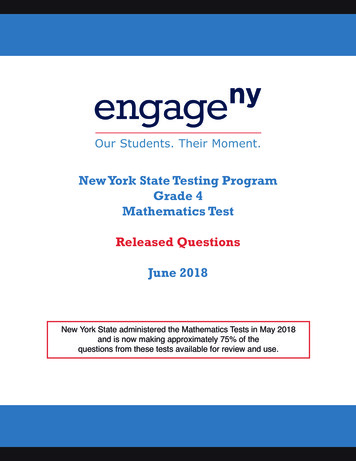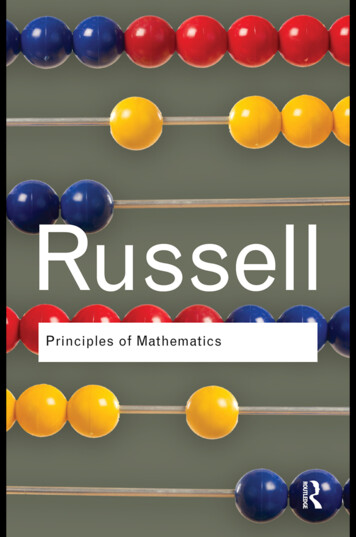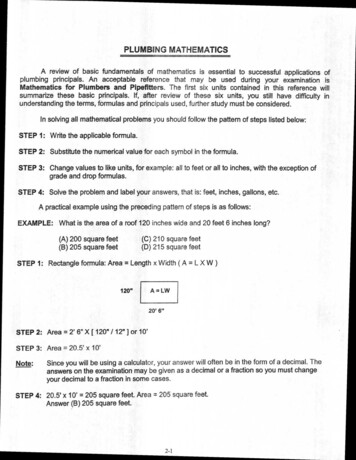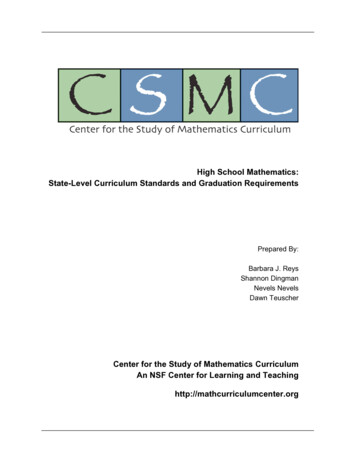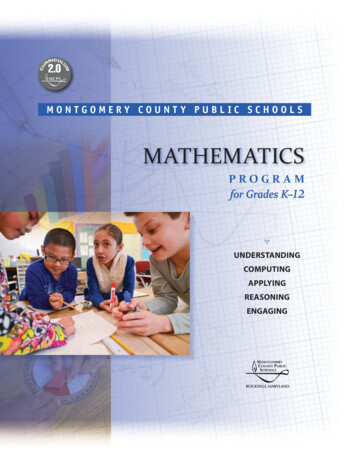
Transcription
MONTGOMERY COUNT Y PUBLIC SCHOOLSMATHEMATICSPROGR AMfor Grades K–12 KVILLE, MARYLAND
Board of EducationMr. Christopher S. BarclayPresidentMr. Philip KauffmanVice PresidentMs. Shirley BrandmanVISIONA high-quality education isthe fundamental right of everychild. All children will receivethe respect, encouragement,and opportunities they needto build the knowledge, skills,and attitudes to be successful,contributing members of aglobal society.Dr. Judith R. DoccaMr. Michael A. DursoMrs. Patricia B. O’NeillMrs. Rebecca SmondrowskiMr. John MannesStudent MemberSchool AdministrationDr. Joshua P. StarrSuperintendent of SchoolsMr. Larry A. BowersChief Operating OfficerDr. Beth Schiavino-NarvaezDeputy Superintendent ofSchool Support and ImprovementDr. Kimberly A. StathamDeputy Superintendent ofTeaching, Learning, and Programs850 Hungerford DriveRockville, Maryland 20850www.montgomeryschoolsmd.org
MARYLANDDear Parents,In the 21st century, a deep understanding of mathematics, and the ability to applythat understanding, is more important than it has ever been. In MontgomeryCounty Public Schools (MCPS), and across the country, mathematics instruction ischanging to make sure we provide our students with the skills and knowledgethey need for success in college and the workplace.This booklet will provide you with some important information about whythese changes are needed; how we are improving math instruction; what deepunderstanding means; and how we are working to meet the needs of all studentsto ensure their success.Please take the time to go through this booklet and visit the MCPS website to findmore helpful math resources and information. If you have further questions, pleasedo not hesitate to ask your child’s teacher or school principal.Sincerely,Joshua P. Starr, Ed. D.Superintendent of Schools
W H Y I S T H E M AT H C U R R IC U LUM C HA NG I NG ?The teachers and administratorsAs MCPS staff compared the CCSS with the 2001MCPS curriculum standards, several trends becameapparent. First, it was clear that many of the CCSSare more complex and challenging. In addition, manystandards in the CCSS are located in earlier gradesthan in the previous MCPS curriculum. Both theCCSS and the 2001 MCPS curriculum standardscontain a high level of rigor and coherence. But theCCSS, like standards in many successful nations,focus on students developing deep understandingin mathematics, defined as the appropriate balanceamong conceptual understanding, procedural skill,and problem solving with an emphasis on application.Math Work GroupFocusing mainly on procedural skill can reducethe development of students’ long-term conceptualunderstanding and blunt the growth of problemsolving skills. The Math Work Group teachers madesimilar observations. They noted that students oftencame well prepared to take formulaic tests but hadof Montgomery County Public Schools (MCPS)are committed to providing each student with achallenging mathematics program. To help reachthat goal, we review our curriculum, instruction, andassessments on an ongoing basis to ensure that a highlevel of rigor is available for every student. Periodically,there are wider reviews that result in systemwideimprovements in the mathematics program. Overthe last few years, there have been three majordevelopments that have significantly impacted themathematics program.In 2008–2009, a representative group of teachers,parents, principals, community members, and centraloffice staff gathered for 18 months to review the MCPSmathematics program. Their work resulted in a numberof recommendations regarding curriculum, acceleration,system achievement targets, and professional development. Several of the key recommendations includedadopting the then-in-development Common Core StateStandards (CCSS), reviewing the impact of the CCSSon the MCPS math program and system targets,expanding professional development in mathematics,and eliminating grade-level skipping of mathematicscontent, while continuing practices that challengestudents who consistently demonstrate proficiency.Internationally Driven Common CoreState StandardsOver the last decade, the United States has consistentlyranked below 20 other nations in K–12 mathematics.The CCSS in Mathematics were developed to improvestudents’ understanding of mathematics comparedwith their international peers.A consortium of 48 states was formed in 2008 to guidedevelopment of new standards, which outline whatstudents should know and be able to do. The authors ofthe CCSS reviewed best practices internationally andconsulted content experts to create a focused, coherent,and rigorous set of standards. Maryland adopted theCCSS in June of 2010.Words in blue italic are defined on the back of this booklet.The MCPS mathematics programhas been redesigned to reflect deeperunderstanding in mathematics.difficulty when presented with rich mathematicaltasks that required use of number sense and strategicthinking. The MCPS mathematics program hasbeen redesigned to help students gain a deeperunderstanding of math and apply that understandingin a variety of ways.The Changing Definition of Collegeand Career ReadinessBeginning with students who entered Grade 9 in 2011, thecolleges and universities within the University System ofMaryland are expecting students to complete Algebra 2 ora significant mathematics course with advanced contentduring their senior year. In addition, many schools andemployers are looking for the 21st century skills suchas persistence, collaboration, and critical and creativethinking that are the focus of Curriculum 2.0.
¾¾ What is Deep Understanding in Math?Students who demonstrate a deepunderstanding of mathematics see it as more thanjust procedures to memorize and replicate ona test. To reach a deep understanding, studentslearn to work collaboratively and to expresstheir understanding in multiple ways. The CCSSStandards for Mathematical Practice (SMP),represented below, are the definition of deepunderstanding in Curriculum 2.0 mathematics.Students who have a deep understanding ofmathematics content—¡¡ make sense of problems and persevere insolving them;¡¡ reason abstractly and quantitatively;¾¾ Curriculum 2.0 MathematicsProgram GoalsThe higher expectations of theCCSS, the recommendations of the Math WorkGroup, and new definitions of college and careerreadiness helped form the four goals of the K–12Curriculum 2.0 Mathematics program:¡¡ Develop students who valuemathematics and see it asuseful to solving problems andmaking sense of the world.¡¡ Engage all students inexperiences with mathematicscontent and processes that help them reachproficiency, defined as Understanding,Computing, Applying, Reasoning, andEngaging (UCARE) in mathematics.¡¡ Ensure that all students master theknowledge, skills, and understandingnecessary to be college and career readyby graduation.¡¡ Prepare students with the desire and skillsnecessary to have the opportunity to takeAdvanced Placement or other college-levelmath courses in high school.¡¡ construct viable arguments and critique thereasoning of others;¡¡ represent real-world situations withmathematical modeling;¡¡ use appropriate tools strategically(manipulatives, calculators, etc.);¡¡ use definitions, calculations, and estimationswith the appropriate level of precision;¡¡ look for and make use of patterns andstructure; and¡¡ look for and express generalities withinmathematics.
¾¾ How Do We Measure DeepUnderstanding of Math?Many of us recall math tests inschool when we memorized procedures andappeared to understand what we learned bycompleting the procedure on a test. Tests thatmeasure the CCSS will continue to measurestudent understanding of procedures andcomputation, but also will measure problemsolving and conceptual understanding. Moreimportant, teachers will be measuring studentunderstanding from a broad spectrum ofinteractions with students, conversations, tests,projects, and observations. Students who deeplyunderstand a mathematical concept are referred toas proficient in that concept. Proficiency is definedin the five intertwined strands of UCARE.¡¡ Understanding—comprehendingconcepts, operations, and relations¡¡ Computing—carrying out procedures¡¡ Applying—formulating and solvingmathematical problems¡¡ Reasoning—using logic to explain asolution or justify why the mathematicsworks¡¡ Engaging—seeing math as useful,sensible, and doableIn addition, integration of the SMP with themathematics content will aid in representing depthof mathematical understanding. Students will needto demonstrate their understanding in multipleways so the teacher can determine if they havereached proficiency.¾¾ How Will We Ensure that AllChildren are Challenged?The deeper understanding and higherexpectations of the grade-level CCSS, and theways of measuring that deep understanding, willchallenge students and help prepare them forcollege and careers. Many students will need morethan this. For these students, MCPS developedadditional enrichment and acceleration. When astudent demonstrates consistent understandingof a mathematical concept, there are enrichmentand acceleration opportunities designed within thecurriculum that extend students’ understanding.There also will be a few students who consistentlydemonstrate a deep understanding of all themathematical concepts of their grade level, andmay need to be advanced. Beginning in Grade 4,there will be access to a compacted curriculum forstudents who demonstrate this need.
C O U R S E S T H A T L E A D T O C O L L E G E A N D C A R E E R R E A D I N E S SThe Curriculum 2.0 (C2.0) Mathematicsmay be ready to work in a compacted course,starting in Grade 4 (second line in graphic below).Students who need support in the grade-levelcourse may need to work in other courses inmiddle school, such as C2.0 Math 7 and C2.0Math 8 (third line in graphic below). Studentstaking these classes will still be on a trajectoryfor Algebra 2 and higher-level math that preparesthem for college. It is anticipated that these courseswill phase out over time as more students reachproficiency in grade-level standards.program develops a deep understanding ofmathematics by building a strong foundationof number sense at the elementary level beforemoving into more advanced content. The chartbelow shows the course options available tostudents that will prepare them for success incollege and careers. Students who are successfulin the grade-level content, as represented in themain series in the chart, will be able to reachAlgebra 1 by Grade 8 and an Advanced Placementcourse, such as AP Calculus, in high school.The kindergarten through Grade 6 mathematicsprogram contains acceleration and enrichmentoptions that challenge students beyond the CCSS.The few students who demonstrate exceptionalproficiency, as defined by UCARE (understanding,computing, applying, reasoning, and engaging),KC2.0Math K*1E le m e n ta r y23C2.0C2.0Math 1* Math 2*C2.0Math 3*456Mi ddle7C2.0Math 4*C2.0Math 5*C2.0Math 6*C2.0I.M.**C2.0 4/5C2.0 5/6C2.0 I.M.*** Including MCPS enrichment and acceleration opportunities** Investigations in Math2012– 2013– 2014– 2015– 2016–2013 2014 2015 2016 2017Shading identifies years of implementation.Hi gh8910C2.0C2.0C2.0Algebra 1 Geometry Algebra 2C2.0 Alg. 1 C2.0 Geom.C2.0 Alg. 2 C2.0 Pre-Cal.C2.0 Math 7 C2.0 Math 8C2.0 Alg. 11112C2.0PreCalculusAP***AP***AP***C2.0 Geom. C2.0 Alg. 2 C2.0 Pre-Cal.*** Advanced Placement Calculus, Advanced Placement Statistics, or other college-level coursesROLL-OUT PLANC2.0 Kindergarten–Math 3C2.0 Math 4C2.0 Math 5C2.0 Math 6C2.0 Math 7 & C2.0 I.M.C2.0 Math 8C2.0 Algebra 1C2.0 GeometryC2.0 Algebra 2C2.0 Pre-CalculusNew minimum qualifications for admissionto University System of Maryland colleges anduniversities include completion of Algebra 2or a significant mathematics course withadvanced content during senior year.MCPS designed the Curriculum 2.0mathematics roll-out to provide a smooth transitionfor students and to ensure that they are ready forthe CCSS. The shading in the chart to the left showsthe year that new courses will be introduced. It isimportant to note that students who are currently inan accelerated pathway of previous courses will stayin that pathway until they reach Algebra 1. Oncein Algebra 1, they will begin the C2.0 Algebra 1course and continue forward from that point inCurriculum 2.0 courses. Students entering C2.0Algebra 1 will be well prepared if they are successfulin the previous course.
GLOSSARY OF TERMS¾¾ How Do I Support My Childin Math?You can help your child do well in mathematics byestablishing a positive attitude toward mathematicsin your home. Be sure to communicate to yourchild that mathematics is simply another way tocommunicate about the world, just like anotherlanguage. Looking for opportunities to talk aboutmath in ways that make sense is important in theearly years. As your child progresses through thegrade levels, be sure to communicate with hisor her teacher to see how you can help at home.Expect your child to solve problems in multipleways, not just using the algorithm or procedureyou may have learned. Clear communicationbetween teachers and parents is an importantpart of ensuring your child’s success in math.MCPS provides parent resources for each gradelevel or course. To access these resources, contactyour child’s teacher or visit these ATIONMoving a student more rapidly to the next appropriateconcept when that student has already demonstratedconsistently strong proficiency in all five strands ofUCARE for previous concepts.COMMON CORE STATE STANDARDSStandards are the list of what students shouldknow and be able to do. The Common Core StateStandards (CCSS) are a set of standards developed bya consortium of 48 states to put the United States ona competitive footing with other nations. Marylandadopted the CCSS in 2010.COMPACTED CURRICULUMAn entire curriculum taught in the same sequence,but in a shorter time span. For example, compactingMath 4, Math 5, and Math 6 into two years, asMath 4/5 in Grade 4 and Math 5/6 in Grade 5.ENRICHMENTLearning opportunities that provide greater depth,application, and complexity to better prepare studentsfor the study of advanced mathematics.PROFICIENCYThe MCPS standard for reaching a deep under standingof mathematics concepts, as defined by UCARE. Forexample, a student who is proficient in mathematicscan complete a procedure, and explain how theprocedure works and why the procedure is themost efficient way to solve a problem.STANDARDS FOR MATHEMATICAL PRACTICEThe Standards for Mathematical Practice (SMP) are aset of eight processes that describe what a student whohas a deep understanding of mathematics can do. TheSMP are part of the CCSS and are included in MCPSCurriculum 2.0.ROCKVILLE, MARYLANDPublished by the Department of Materials Managementfor the Office of Teaching, Learning and Programs0761.13 Editorial, Graphics & Publishing Services 1/13 130,000Copyright 2013 Montgomery County Public SchoolsRockville, MarylandUCAREThe five intertwined strands that define mathematicalproficiency are understanding, computing, applying,reasoning, and engaging in mathematics.
Advanced Placement or other college-level math courses in high school. ¾ What is Deep Understanding in Math? Students who demonstrate a deep understanding of mathematics see it as more than just procedures to memorize and replicate on a test. To reach a deep understandi
